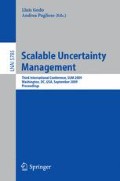Abstract
People try to make sense of the usually incomplete reports they receive about events that take place. For doing this, they make use of what they believe the normal course of thing should be. An agent\(\textquoteright\)s beliefs may be consonant or dissonant with what is reported. For making sense people usually ascribe different types of relations between events. A prototypical example is the ascription of causality between events. The paper proposes a systematic study of consonance and dissonance between beliefs and reports. The approach is shown to be consistent with findings in psychology. An implementation is presented with some illustrative examples.
Access this chapter
Tax calculation will be finalised at checkout
Purchases are for personal use only
Preview
Unable to display preview. Download preview PDF.
References
Richard, J.-F.: Les activites mentales: comprendre, raisonner, trouver des solutions. Armand Colin, Paris (1998)
Gobet, F., Lane, P.C.R., Croker, S., Cheng, P.C.H., Jones, G., Oliver, I., Pine, J.M.: Chunking mechanisms in human learning. Trends in Cognitive Sciences 5, 236–243 (2001)
Anderson, J.R., Lebiere, C.: The atomic component of thought. Erlbaum, Mahwah, NJ (1998)
Shortliffe, E.H.: Computer-based medical consultations: MYCIN. Elsevier, New York (1976)
Abelson, R.P.: The Psychological status of the script concept. American Psychologist 36, 715–729 (1981)
Schank, R.C., Abelson, R.P.: Scripts, plans, goals, and understanding. Lawrence Erlbaum, Hillsdale (1977)
Dubois, D., Prade, H.: Modeling the role of (ab)normality in the ascription of causality judgements by agents. In: NRAC 2005, pp. 22–27 (2005)
Benferhat, S., Bonnefon, J.F., Chassy, P., Da Silva Neves, R.M., Dubois, D., Dupin de Saint-Cyr, F., Kayser, D., Nouioua, F., Nouioua-Boutouhami, S., Prade, H., Smaoui, S.: A comparative study of six formal models of causal ascription. In: Greco, S., Lukasiewicz, T. (eds.) SUM 2008. LNCS (LNAI), vol. 5291, pp. 47–62. Springer, Heidelberg (2008)
Bonnefon, J.F., Da Silva Neves, R.M., Dubois, D., Prade, H.: Predicting causality ascriptions from background knowledge: Model and experimental validation. Inter. J. of Approximate Reasoning 48, 752–765 (2001)
Goldvarg, Y., Johnson-Laird, P.N.: Naive causality: a mental model theory of causal meaning and reasoning. Cognitive Science 25, 565–610 (2001)
Mandel, D.R., Lehman, D.R.: Counterfactual thinking and ascriptions of cause and preventability. Journal of Personality and Social Psychology 71, 450–463 (1996)
McCloy, R., Byrne, R.M.J.: Semifactual ”even if” thinking. Thinking and Reasoning 8, 41–67 (2002)
Lagnado, D.A., Sloman, S.A.: Time as a guide to cause. Journal of Experimental Psychology Learning Memory and Cognition 32, 451–460 (2006)
Kayser, D., Nouioua, F.: About Norms and Causes. International Journal of Artificial Intelligence Tools 14, 7–24 (2005)
Hilton, D.J., Slugoski, B.R.: Knowledge-based causal attribution: The abnormal conditions focus model. Psychological Review 93, 75–88 (1986)
Festinger, L.: A theory of cognitive dissonance. Standford University (1957)
Miller, G.A.: The magical number seven, plus or minus two: Some limits on our capacity for processing information. Psychological Review 63, 81–97 (1956)
Simon, H.A.: How big is a chunk? Science 183, 482–488 (1974)
Campitelli, G., Gobet, F., Head, K., Buckley, M., Parker, A.: Brain localization of memory chunks in chessplayers. Inter. J. of Neuroscience 117, 1641–1659 (2008)
Prade, H.: Responsibility judgments: steps towards a formalization. In: Magdelena, L., Ojeda- Aciego, M., Verdegay, J.L. (eds.) International Conference on Information Processing and Management of Uncertainty in Knowledge-based Systems, pp. 145–152. University of Malaga (2008)
Atkinson, R.C., Shiffrin, R.M.: Human memory: A proposed system and its control processes. In: Spence, K.W., Spence, J.T. (eds.) The psychology of learning and motivation, vol. 2. Academic Press, London (1968)
Shiffrin, R.M., Atkinson, R.C.: Storage and retrieval processes in long term memory. Psychological Review 76, 179–193 (1969)
Chassy, P., Gobet, F.: A model of emotional influence on memory processing. In: Cañamero, L. (ed.) AISB 2005: Symposium on Agents that Want and Like, pp. 21–25. University of Hertforshire, Hatfield (2005)
Kraus, S., Lehmann, D., Magidor, M.: Nonmonotonic reasoning, preferential models and cumulative logics. Artificial Intelligence 44, 167–207 (1990)
Author information
Authors and Affiliations
Editor information
Editors and Affiliations
Rights and permissions
Copyright information
© 2009 Springer-Verlag Berlin Heidelberg
About this paper
Cite this paper
Chassy, P., Prade, H. (2009). Making Sense of a Sequence of Events: A Psychologically Supported AI Implementation. In: Godo, L., Pugliese, A. (eds) Scalable Uncertainty Management. SUM 2009. Lecture Notes in Computer Science(), vol 5785. Springer, Berlin, Heidelberg. https://doi.org/10.1007/978-3-642-04388-8_10
Download citation
DOI: https://doi.org/10.1007/978-3-642-04388-8_10
Publisher Name: Springer, Berlin, Heidelberg
Print ISBN: 978-3-642-04387-1
Online ISBN: 978-3-642-04388-8
eBook Packages: Computer ScienceComputer Science (R0)

